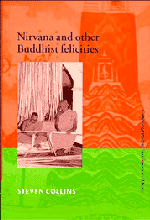Book contents
- Frontmatter
- Contents
- Preface and acknowledgments
- List of abbreviations
- Textual chronology
- General introduction: Buddhism and civilizational history 1 – structures and processes
- PART 1 NIRVANA IN AND OUT OF TIME
- Introduction to part 1: systematic and narrative thought - eternity and closure in structure and story
- 1 The concept of nirvana
- 2 The imagery of nirvana
- 3 Nirvana, time and narrative
- Conclusion to part 1: modes of thought, modes of tradition
- PART 2 PARADISE IN HEAVEN AND ON EARTH
- Appendices (translated texts)
- Bibliography
- Glossary and index of Pali and Sanskrit words
- Name index
- Subject index
1 - The concept of nirvana
Published online by Cambridge University Press: 18 December 2009
- Frontmatter
- Contents
- Preface and acknowledgments
- List of abbreviations
- Textual chronology
- General introduction: Buddhism and civilizational history 1 – structures and processes
- PART 1 NIRVANA IN AND OUT OF TIME
- Introduction to part 1: systematic and narrative thought - eternity and closure in structure and story
- 1 The concept of nirvana
- 2 The imagery of nirvana
- 3 Nirvana, time and narrative
- Conclusion to part 1: modes of thought, modes of tradition
- PART 2 PARADISE IN HEAVEN AND ON EARTH
- Appendices (translated texts)
- Bibliography
- Glossary and index of Pali and Sanskrit words
- Name index
- Subject index
Summary
To consider the concept of nirvana as a product of Buddhist systematic thought, this chapter depicts the taxonomy within which it occurs as a structured whole, rather than telling the story of how that whole came, historically, to be created. It does however, discuss the evolution of relevant ideas in pre-Buddhist Brahmanism in 1.1.a, and offers a few remarks in 1.2.b about some less than perfectly understood meditative attainments which seem to result from emphases within the tradition which are divergent and perhaps contradictory. In sections 1.1, 1.2 and 1.3 I organize the material in my own way, but the aim is to say nothing about the concept of nirvana which is foreign to the texts from which this account is taken. 1.4 and 1.5 revert to an external, etic viewpoint, in the former to dispose of what is prima facie a good question to ask about nirvana (can one “desire” it?), and in the latter to reflect on the relation between what is said and what is left unsaid in ideological discourse.
ACTION, TIME AND CONDITIONING
Time and salvation in pre-Buddhist Brahmanism
In this regard, as in many others, the thought of Buddhism is clearly continuous with that of the pre-Buddhist Brahmanical tradition.
- Type
- Chapter
- Information
- Nirvana and Other Buddhist Felicities , pp. 135 - 190Publisher: Cambridge University PressPrint publication year: 1998



